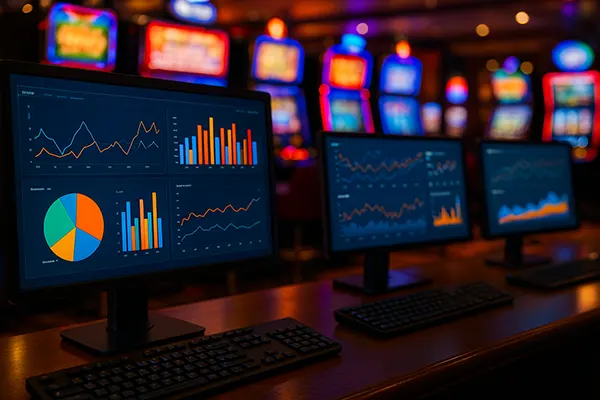
Modern gambling venues increasingly rely on real-time analytics to understand player behaviour and adapt their strategies instantly. By collecting and interpreting massive volumes of data, operators can track patterns, personalise experiences, and ensure responsible gaming practices. This approach not only improves user engagement but also strengthens operational efficiency and compliance.
Casinos today collect player data from various sources, including slot machines, table games, loyalty programmes, and online user accounts. Each interaction creates a digital footprint containing valuable information on spending habits, play frequency, and game preferences. This data is transmitted and processed in real time through advanced analytics systems.
The collected data is often structured using big data frameworks, allowing analysts to group players based on behavioural patterns. Real-time tracking enables operators to react immediately if they detect unusual activity or potential problem gambling behaviours. It also allows rapid identification of high-value customers who might require personalised offers.
Importantly, all this data collection must comply with data protection regulations, such as the GDPR in the European Union. Casinos use encryption and anonymisation techniques to protect personal information while still gaining insights from the aggregated datasets.
To manage these large data flows, casinos deploy powerful data warehousing systems and machine learning models. These tools allow real-time processing and visualisation of metrics, such as time spent playing or betting trends. Predictive algorithms can identify when a player is likely to stop playing and trigger tailored retention campaigns.
Many operators also use customer relationship management (CRM) software integrated with real-time analytics dashboards. This combination helps managers adjust marketing strategies instantly based on current activity. Additionally, real-time monitoring of payment behaviour helps prevent fraudulent transactions and ensures financial security.
The evolution of artificial intelligence plays a key role in improving the precision of these analytics tools. AI models can analyse massive datasets quickly and adapt to new behavioural trends without human intervention, making them invaluable for modern gambling environments.
Real-time analytics enables casinos to create highly personalised experiences for each user. By analysing what games players prefer and how long they stay engaged, operators can recommend relevant games or bonuses that match their interests. This personalised approach increases satisfaction and extends player lifetime value.
Loyalty programmes also benefit from data-driven personalisation. Instead of offering generic rewards, casinos can adjust bonuses based on real-time data about a player’s recent activity and preferences. This increases the likelihood that players will use their rewards, reinforcing engagement and loyalty.
Furthermore, analytics can improve customer support by providing agents with immediate information about a player’s history and activity. This allows for faster resolution of issues and more meaningful interactions between staff and customers.
Real-time segmentation divides players into groups based on their current behaviour rather than past data alone. This allows operators to launch targeted promotions exactly when they are most effective, such as sending a bonus offer to a player showing signs of losing interest.
Segmentation can also be used to identify at-risk players and deliver responsible gaming messages in real time. When the system detects early warning signs of problematic behaviour, it can trigger automated alerts, limits, or self-exclusion options to protect the player.
This proactive approach benefits both the operator, by reducing risk, and the player, by ensuring a safer gambling environment. It aligns with regulatory expectations and builds public trust in the industry.

Compliance with regulatory frameworks is a critical aspect of real-time analytics. Modern gambling venues must demonstrate that they monitor player behaviour to prevent money laundering, fraud, and problem gambling. Real-time systems provide the evidence needed to satisfy regulators and maintain licences.
Analytics tools can detect suspicious betting patterns that may indicate fraudulent activities. By flagging these anomalies immediately, operators can halt transactions, investigate accounts, and report potential violations to authorities. This protects both the business and its players.
Responsible gambling initiatives also rely on real-time data. By monitoring betting intensity, session length, and spending limits, casinos can intervene before a player reaches harmful behaviour thresholds. These interventions may include temporary account freezes, mandatory cool-off periods, or personalised messages encouraging responsible play.
With the collection of sensitive player data comes the responsibility to safeguard it. Casinos implement multi-layered cybersecurity systems, including firewalls, encryption, and regular audits, to prevent breaches. These defences ensure that private data cannot be accessed or misused.
Ethical handling of data is equally important. Operators must be transparent about what data they collect, how it is used, and how long it is stored. Providing clear privacy policies builds trust and aligns with legal requirements.
As analytics technologies evolve, ethical guidelines help ensure that player data enhances the gambling experience without compromising safety or autonomy. Striking this balance is essential for maintaining credibility and long-term success in the industry.